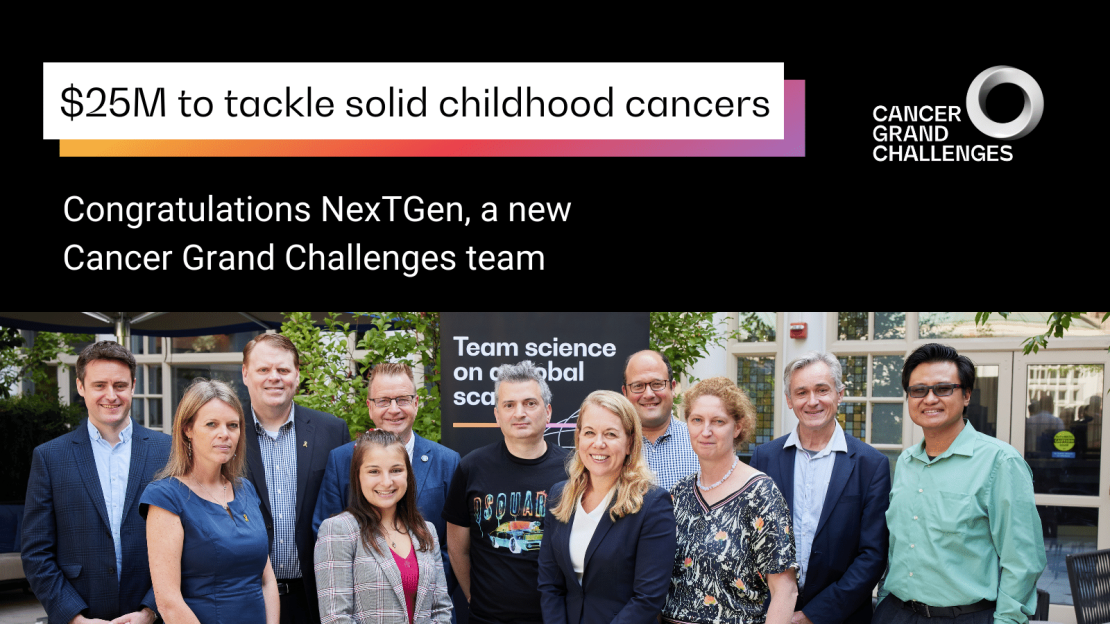On 16 June 2022, we announced 4 new Cancer Grand Challenges teams taking on some of the toughest challenges in cancer research. Here, meet the NexTGen team receiving $25m to take on the Solid Tumors in Children challenge.
Cancer is a leading cause of death by disease in children worldwide. Although survival has increased for some pediatric cancers, such as blood cancers, survival for some solid tumors has seen little improvement for more than 30 years. Standard treatments for solid tumors rely on radiotherapy and cytotoxic agents, which often cause severe long-term health complications, such as learning difficulties, abnormal growth and infertility. For children who relapse, few second-line treatments are typically available.
The Solid Tumors in Children Cancer Grand Challenge invited teams to deepen our understanding of childhood solid cancers; to discover, develop and optimize novel therapeutics for children with these diseases; and to launch early-phase testing to probe the biology underlying therapeutic responses. Discoveries made through this challenge may improve survival in children with solid cancers and diminish the lifelong toxicities often experienced by survivors.
Taking on this challenge is the NexTGen team, co-led by Professor Catherine Bollard (Children’s National Hospital, US) and Dr Martin Pule (University College London, UK), with collaborators across the UK, US and France. Together, the team hopes to bring next-generation chimeric antigen receptor (CAR) T-cell therapies to children with sarcomas and brain tumors.
Here, Catherine reflects on the team’s hopes for their programme.
Bridging the gap: lessons learned from blood cancers applied to childhood solid tumors
"I came to the US in 2000 to develop novel cell therapies for patients with refractory cancers. At that time, cell therapy was a very new field, and many people weren’t convinced of its efficacy in patients. Considerable efforts led to the development of the first CAR T-cell therapy to treat pre-B-cell acute lymphoblastic leukemia by targeting the antigen CD19.
Witnessing and being part of this progress has been incredible. I served on the Oncologic Drugs Advisory Committee for the US Food and Drug Administration when the first CD19 CAR T-cell product was approved for childhood B-cell malignancies in 2017. The applications of CAR T-cell therapy continue to expand, achieving durable responses without long-term toxicity in people with a range of hematologic malignancies.
These characteristics are precisely those required for developing new treatments for children with solid cancers. We’ve identified five interconnected core barriers to producing new therapies. If we can overcome them, we believe CAR T-cell therapy has great potential for these children. Our programme builds on the lessons learned in developing cell therapies for hematological malignancies, particularly the importance of early clinical testing and the power of reverse translation. We will perform clinical and basic research together, to facilitate seamless knowledge exchange from the lab to the clinic and back again, and will continually refine our approach to the challenge.
What excites me most about this approach is the energized, passionate group of people we’ve brought together, who might not have collaborated otherwise. That’s where out-of-the-box thinking comes from – suddenly, you find you’re learning from each other and working out how you can use each other’s special expertise to tackle a complex problem. We’re also excited to unite world-renowned scientists with rising stars who will bolster our programme and who we believe will become the future leaders in the childhood oncology field.
With this Cancer Grand Challenge, we hope to bring next-generation CAR T-cell therapies to children with solid cancers. Big problems remain to be addressed, but we believe that they can be solved, and we’re the team to solve them."
The Cancer Grand Challenges NexTGen team is supported by Cancer Research UK, the National Cancer Institute and The Mark Foundation for Cancer Research.
